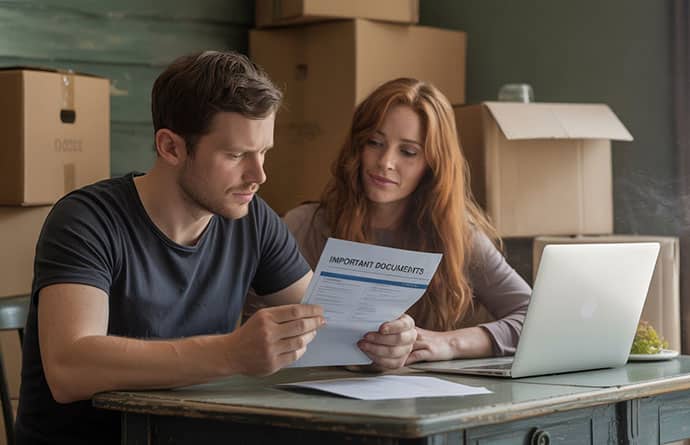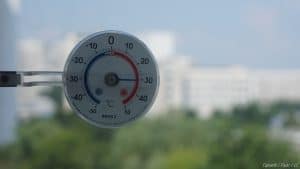How to Verify a Mover’s Legitimacy
When you hire interstate movers in the U.S., the first step is to confirm they have a valid USDOT number issued by the Federal Motor Carrier Safety Administration (FMCSA).
What Is a USDOT Number and Why Does It Matter?
- A USDOT Number is a unique identifier issued by the FMCSA to track a moving company’s safety records, compliance with federal regulations, and operational status.
- It will also clearly show if the mover is a broker or an actual mover and how many vehicles they operate.
Who Needs a USDOT Number?
- Interstate movers — required by law.
- Intrastate movers — required in certain states or if transporting hazardous materials, heavy vehicles, or large passenger groups.
- States requiring USDOT for all commercial vehicles include: AL, AK, AZ, CO, CT, FL, GA, IN, IA, KS, KY, ME, MD, MI, MN, MO, MT, NJ, NY, NE, NC, OH, OK, OR, PA, SC, TN, TX, UT, WA, WV, WI and WY.
You may also like to read: Moving Insurance. One of the most common mistakes when moving home is being underinsured as a result of not understanding a mover’s insurance. This guide explains all you need to know about the types of insurance that a moving company will offer you.
How to Check a Mover’s USDOT Number
You can verify a mover’s USDOT number using the FMCSA’s SAFER database:
Extremely Important Pro tip: Ensure you spell the company’s name exactly; many scam movers use a variation of a legitimate mover’s name to trick you. If possible, always use the exact DOT number they give you to conduct your research.
Review the company’s profile for:
- Operating Status (look for “Active” or “Authorized for Household Goods”)
- Contact Information (should match what the mover gave you)
- Type of Cargo (must include “Household Goods”, it will have a bold X next to it)
- Operation Type (must be “Interstate” if moving across state lines, look for the X)
- Check inspection history and safety rating (look for a “Satisfactory” rating).
You may also like to read: How to Avoid Moving Scams. This is a comprehensive guide on how to identify and avoid moving scams.
Check Local State Licenses for Local Movers
While USDOT numbers cover federal regulation for interstate moves, many moves are local or intrastate, and these require state-issued licenses.
Why Local Licensing Is Important
- Protects You from Fraud – Unlicensed movers can take your deposit and disappear.
- Ensures Accountability – Licensed movers must comply with state regulations.
- Helps in Dispute Resolution – If there’s damage or loss, state agencies can intervene.
- Proof of Insurance – State licensing usually requires proper insurance coverage.
How to Check a Local Mover’s State License
Follow these steps before hiring a local mover:
- Identify Your State’s Licensing Authority (use the link below to find your local SOS website)
- Most states have a Department of Transportation, Public Utilities Commission, or Consumer Protection Agency that regulates movers.
Example: In California, local movers must be licensed by the California Public Utilities Commission (PUC).
Visit the Official State Website
- Search “[Your State] moving company license lookup” or visit your state SOS site.
- Enter the Mover’s Business Name or License Number
- Legitimate movers will give you their state license number upon request.
- Verify Key Information
- License Status – Must be active.
- Legal Business Name & Address – Must match what’s on the contract.
- Insurance Coverage – Look for cargo and liability insurance.
- Check for Complaints or Disciplinary Actions
- Many state websites list violations or fines.
Visit www.llcuniversity.com for links to the SOS Business Entity Search pages for every state.
You may also like to read: Hiring Local Movers. This guide explains all you need to know about how to hire local movers, how much they cost, the services they offer, and how to protect yourself against bad local movers.
Safety Checklist For Hiring Movers
To ensure a safe, smooth, and stress-free move, always:
- Check the USDOT number (for interstate moves).
- Verify state licensing (for intrastate/local moves).
- Review insurance and safety records.
- Find out if the company belongs to a movers’ association. If the company you consider hiring for your move holds accreditation from a well-known and highly esteemed movers’ association, it is a guarantee of reliability and professionalism.
- Check the company’s rating with the BBB.
- Find out if the company has won any awards or accolades for service.
- Ask for references and get recommendations from other people who have recently used the movers’ services.
- Read reviews left by previous customers.
- Visit the company’s webpage and look for warning signs of moving fraud or convincing evidence of the movers’ reliability and competence.
- Check their social media pages.
- Join local forums to get useful feedback from people who have recently worked with the company, etc..
- Research the database of reputable consumer protection sites, such as ProtectYourMove.gov, etc., to check the company’s complaint history.
- Examine the movers’ paperwork to ensure that it is complete and clear, and most importantly, that you understand everything within the contract.
You may also like to read: Understanding the Bill of Lading. One of the most crucial documents you will be given by your mover is the Bill of Lading, and it is essential that you understand what it means. This guide tells you all you need to know.
Of course, being licensed does not guarantee the trustworthiness of a mover, but it allows you to gather information that you cannot get any other way, and it is another useful tool to help guard yourself against moving scams.
Good luck with your move, and be sure to visit our home moving blog, which is packed with guides to make every aspect of your home move easier, cheaper, and safer.
Also Read









Share your thoughts by leaving a comment